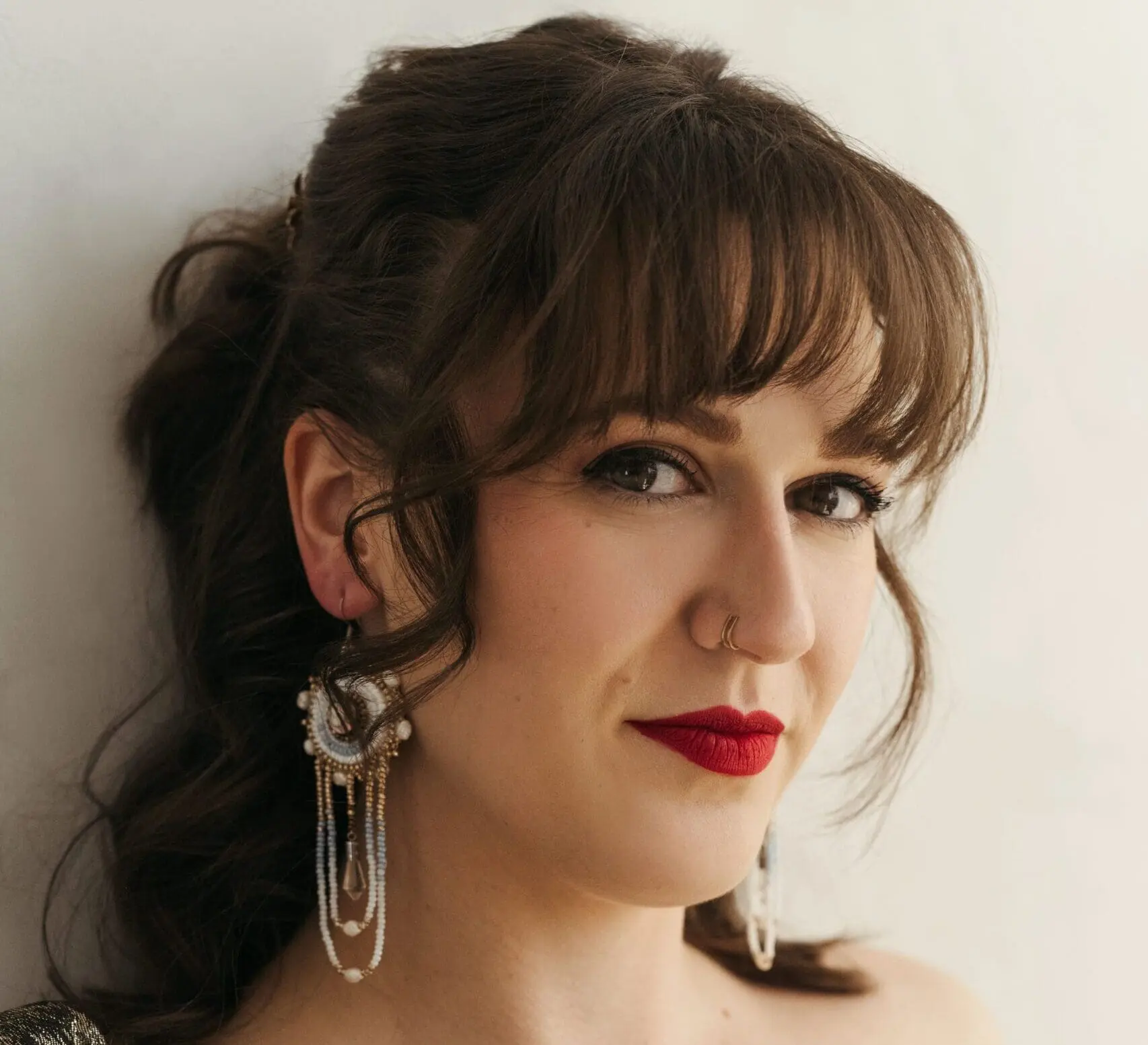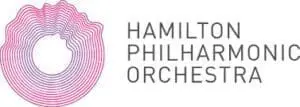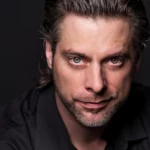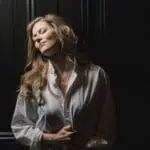The Artist of the Week is Métis mezzo-soprano Rebecca Cuddy. She will be performing Ian Cusson‘s Songs From the House of Death with the Hamilton Philharmonic Orchestra as part of their Feher Conducts Brahms concert on November 9th. (tickets and info here).
Rebecca is an interdisciplinary artist who works in opera, theatre and visual arts. This past season she performed with Soundstreams, Symphony New Brunswick, Toronto Symphony Orchestra, West Edge Opera, Manitoba Opera and, as a member of The Indigidivas, with Allegra Chamber Orchestra and Calgary Philharmonic. As a theatre creator, Rebecca creates interdisciplinary works that incorporate visual arts, languages and music. She was the inaugural artist and co-creator of the Canadian Opera Company’s Land Acknowledgement Commissioning Program, co-created where the water meets the land with Julie McIsaac and has directed at the Stratford Festival as part of the Langham Directors’ Workshop.
This week, Rebecca chats with us about her very first trip to the opera, how she copes with the stress of auditions and what being brave means to her. Read on to find out more.
Favourite place?
I feel very lucky to say I travel a lot to sing, but it means I tend to only be home a few weeks at a time. So it’s not unique, but my favourite place and the one I miss the most is home.
If you weren’t a singer, you’d be…?
If I weren’t a singer, I’d probably be a lawyer. I feel a lot of the skills are transferable, especially the behind the scenes negotiating, contract and admin work singers do daily. Not to mention the extreme attention to detail. I’ve always thought I might study law one day.
Which opera role do you want to be singing right now?
I’d love a shot at Cherubino, he’s such a cutiepie. I’ve always loved Mozart, especially the comedies. I believe Così fan tutte was the second opera I saw around age 11, and it was so fun, I was hooked! Though I mostly work in new music premieres at this time, I adore the standard rep and would like to sing it more often.
Which role do you wish you could sing, but is not in your voice type?
It has to be Cleopatra in Giulio Cesare in Egitto. Though it often gets cut for time, “Se pietà di me non senti” is one of my all-time favourite arias. It is absolutely devastating. Every single aria she sings either completely delights or tears me up. She’s an amazing character.
Tent or hotel?
Tent. My husband and I try to get out in the backcountry every chance we get. I recently premiered Bulrusher with West Edge Opera in Oakland, California. After the show closed, he and I spent a week camping in the amazing Sequoia and Yosemite National Parks!
What was the first opera you ever saw?
The first opera I ever saw was Rigoletto at the Canadian Opera Company. My grandpa gifted us the tickets and I don’t think I blinked for the entire show. I remember being fascinated by the story and thinking that Gilda was impossibly lovely. It was so different from any live theatre I’d seen, granted I was only 10 at the time. I also remember being pleased that I knew some of the songs from hearing them elsewhere, probably in commercials or Bugs Bunny!
Where did you go to school?
I went to three schools to study voice and theatre. I did my master’s in voice and opera in the UK at the Royal Academy of Music and my undergraduate in voice at Western University. I felt very connected to classical music while I lived in London. I spent a lot of time in the Royal Opera House £7 seats (well, let’s be real, standing room) and in Shoreditch, catching bands as they came through the city. Most recently, I did a two-year artist residency at The National Theatre School of Canada where I studied directing, playwriting and acting. All were formative and amazing experiences that helped me gain confidence as a performer. I really enjoy being a student!
What’s a big investment for an opera artist, but totally worth it?
Lessons! It’s an ongoing investment and the most important one in my opinion. I meet with my teacher Claudiu Stoia once a week. It improves my singing, keeps me on track with my performance preparation, we touch base about goals and, maybe most important, Claudiu is one of the funniest people I know, so we do it all while having a good laugh!
What’s the best advice you have ever been given?
It’s not new advice and its not anything that I hadn’t been told before, but my first year working professionally a colleague told me, “Rebecca, you’re a good singer and you’re fun to work with, but if you can’t show up on time… well, there are a lot of other good singers in Toronto. People notice when you’re late.” I have ADHD so I had always struggled with time management and was constantly embarrassed about being late. After that exchange, I got my act together. I just didn’t know time management was a skill you need to develop. Now I’m everywhere at least 30 minutes early and it’s done my nerves, and my career, a whole lot of good.
Do you approach singing and/or upcoming projects differently today than you did at the beginning of your career?
Absolutely. It’s so important that singers identify their strengths and methods early on and continue to build on that foundation. Recognize that no one is watching, so you can prepare in the way that best serves you, and that may look different than how you were taught in undergrad. For example, I highlight everything I need to bring out of the score, like time signature changes and tempo changes, and I still write my counts in. I pick up music very quickly, sometimes too quickly which can lead to sloppy, avoidable mistakes. Having identified this, I know I can do character development work passively and in the room with the director, while sitting down at the piano and being more strict and purposeful about music preparation.
What’s the biggest risk you’ve taken for a production?
Instead of speaking up for myself I tried to be “easy to work with,” because I thought it would help me be hired again in the future. The decision to grin and bear a director’s wishes rather than speak up about the pain I was in led to near fractures in both of my feet. I missed opening and it took me out of commission for two weeks. It took a few years for my feet to fully recover. I know I am not the only opera singer with a story about injured feet from bad shoes and the like. So this is my soap box to say if a director is asking something of you that is literally damaging your body, they can’t feel it, you can. Tell them and don’t injure yourself, it’s not worth the heartache. Most importantly, taking safety seriously doesn’t make you difficult to work with.
The music industry is tough, and filled with rejection. How do you cope? Does it get easier?
For auditioning I don’t think it gets easier, you’re constantly putting yourself out there and it’s hard, especially when feedback is rarely provided. What I do believe is you can have strategies for auditioning to make it feel like clockwork. Practicing mindfulness ahead and post audition, and remembering that the audition is not your ultimate goal, what you’re working towards is much bigger and this is just a necessary step on the journey.
Do you think singers and performers have a more powerful inner life?
I can’t argue for more powerful, but performers certainly do have a lot going on inside their little heads, and I think that’s what makes it all so fun. It is opera after all, you have to lean into delusion.
When was the first time you cried at the opera?
Oh I am a big crier, I cry all the time at opera. The first one must be Dialogues des Carmélites, also at the COC years ago. The set design was just so striking and the movement in the final scene was extremely visceral, alongside the music of course. I don’t think these were just sadness tears, but a fair amount of fear and awe as well. That’s what is amazing about opera, it can be all encompassing of the senses, and there is physically and emotionally no escape.
What does it mean to be brave with music?
For me, being brave with music means having the courage to give yourself over fully to the performance. Letting go of those instilled feelings that singing needs to be perfect or performed a specific way you think people want to hear it. It also means trusting your technique to carry you through that commitment. When a performer is fully engaged in what they’re doing, it’s very hard not to be along for the ride.
LEARN MORE ABOUT REBECCA CUDDY
VISIT HER WEBSITE
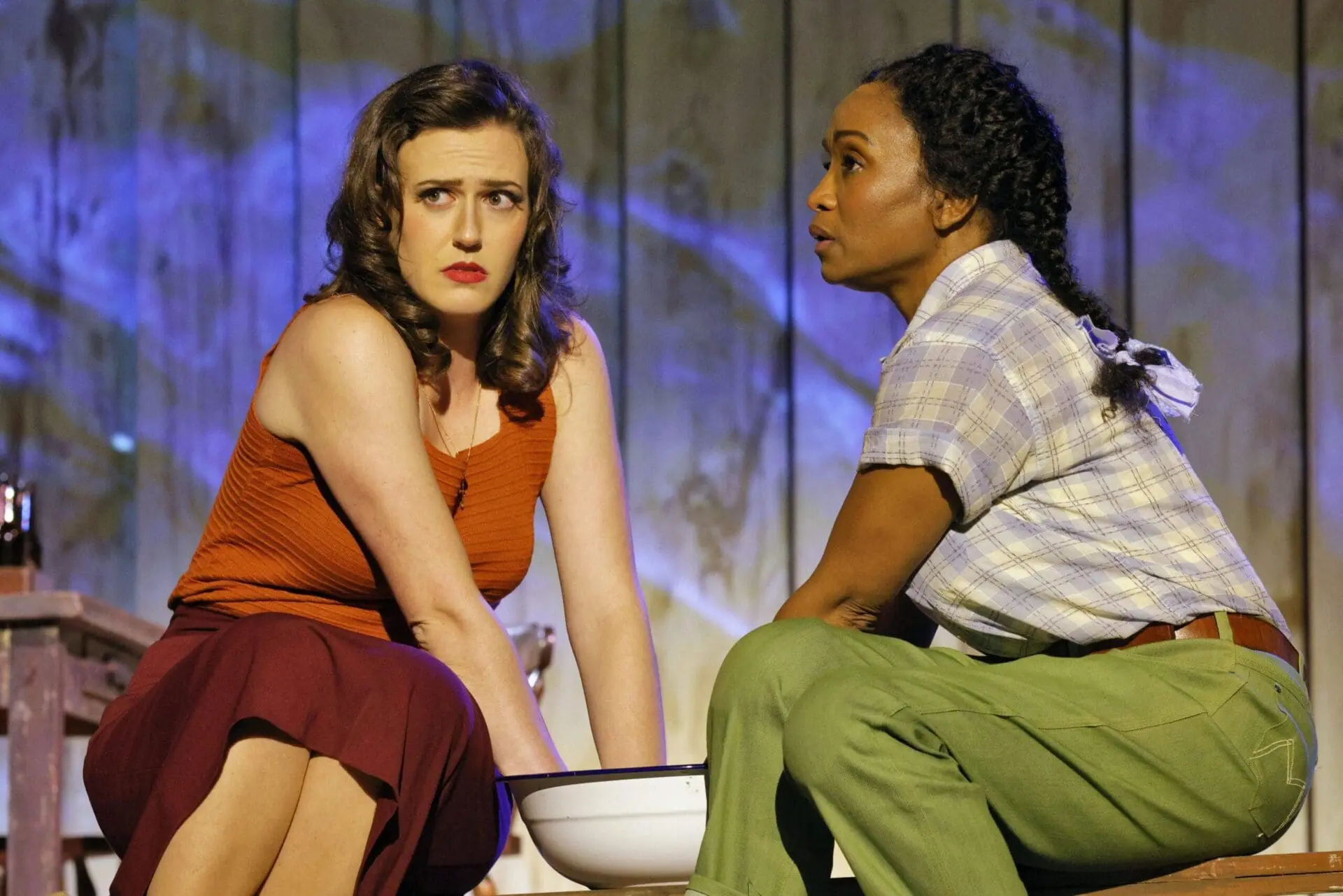
© Cory Weaver Photography
Bulrusher with West Edge Opera – Shawnette Sulker as Bulrusher, Rebecca Cuddy as Madame
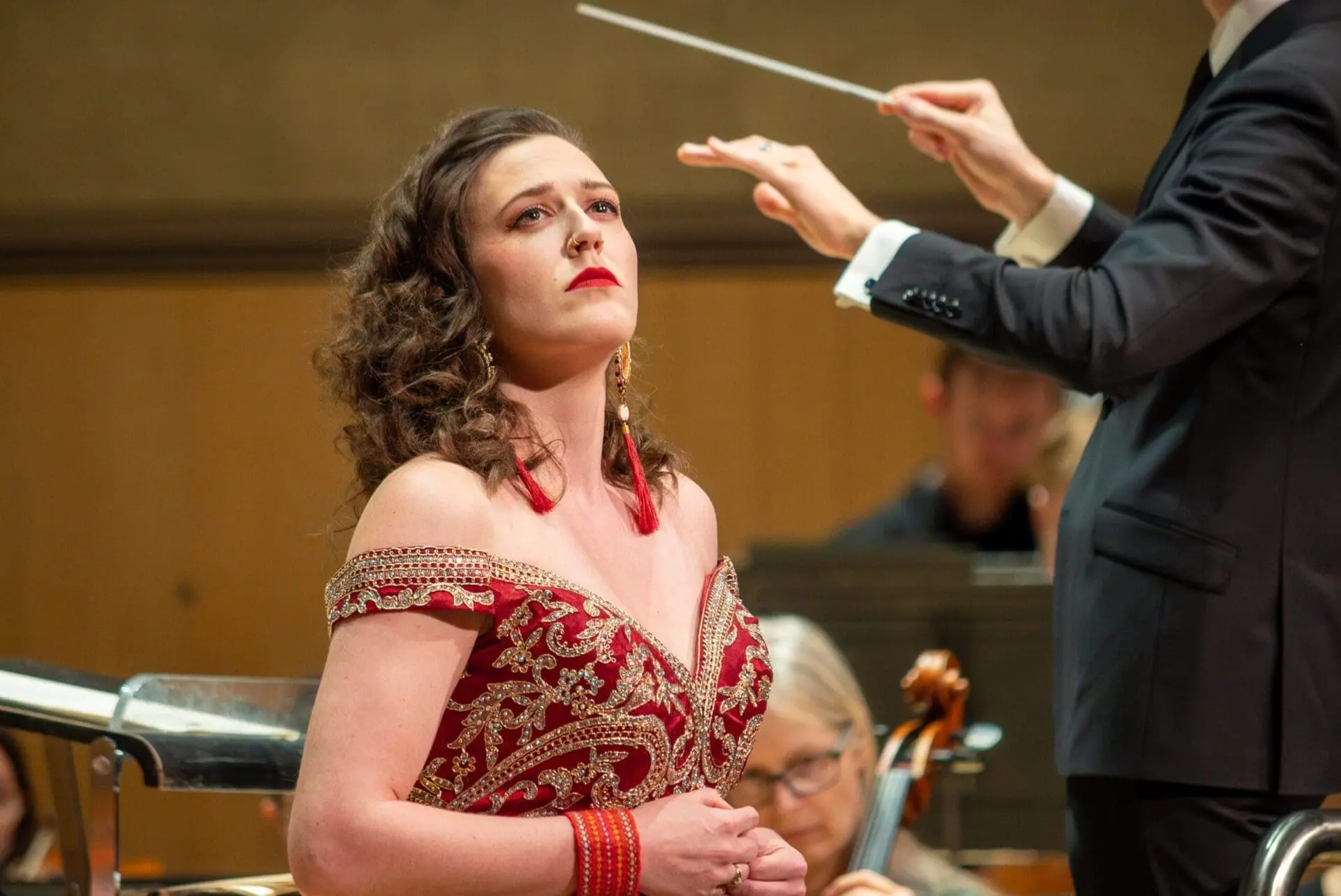
© Allan Cabral
With the Toronto Symphony Orchestra
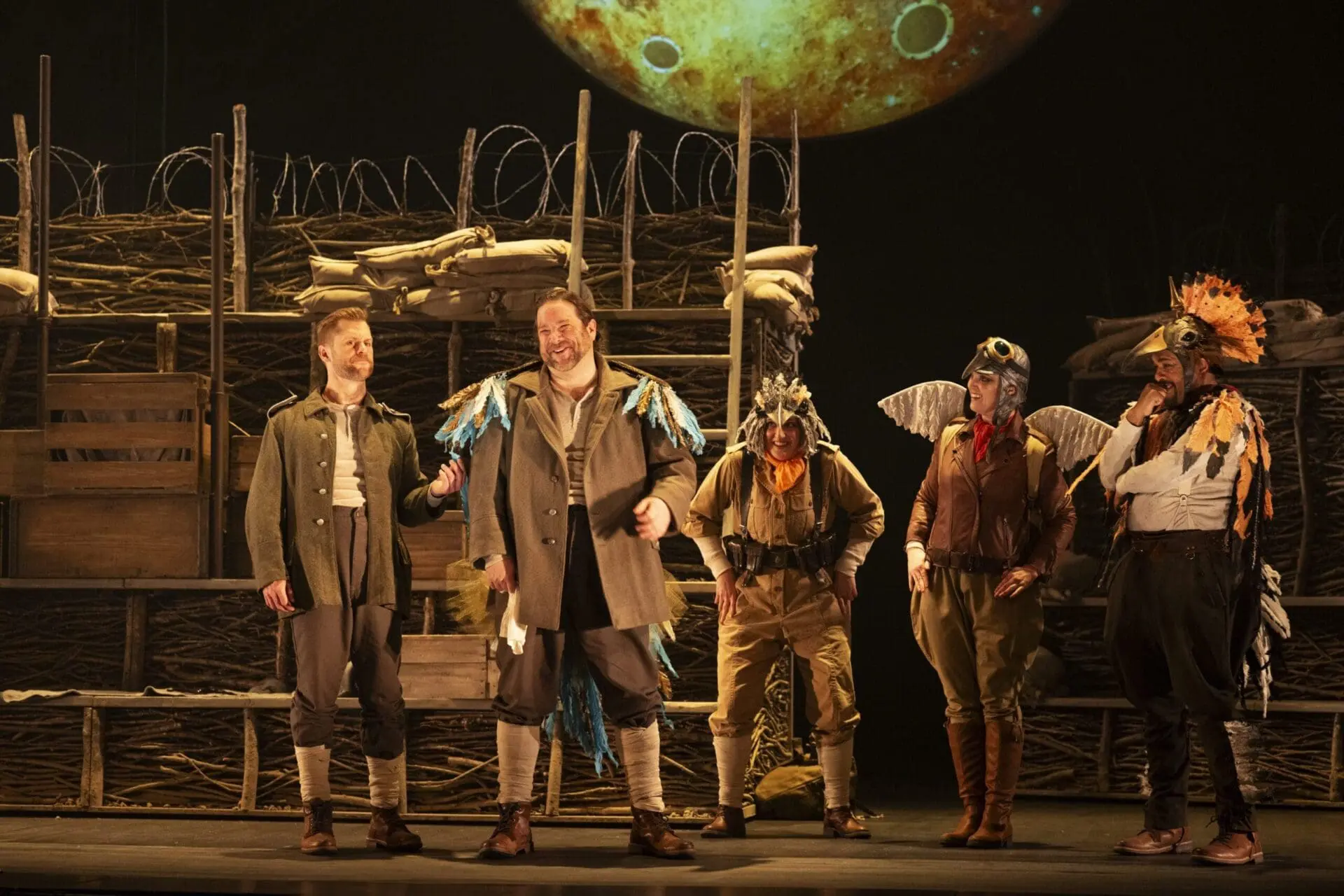
© David Cooper Photography
The Birds with Pacific Opera Victoria
L-R, Adrian Kramer as Hoffegut, Peter Barrett as Ratefreund, Rebecca Cuddy as Drossel, Jacqueline Woodley as Zaunschüpfer and Justin Welsh Wiedhopf
Feher Conducts Brahms
Hamilton Philharmonic Orchestra
November 9
CONDUCTOR: Andrei Feher
MEZZO-SOPRANO: Rebecca Cuddy
Join the HPO and conductor Andrei Feher with mezzo-soprano Rebecca Cuddy as they plumb the emotional depths of Rachmaninoff’s “song without words”, and Ian Cusson’s moving song cycle setting texts by U.S. Poet Laureate and Muscogee Nation member Joy Harjo— an empowering exploration of love, relationships, and woman-ness. Then, revel in the warmth of Brahms’ sunny Second Symphony— a balm for the soul.
Opera Canada depends on the generous contributions of its supporters to bring readers outstanding, in-depth coverage of opera in Canada and beyond.
Please consider subscribing or donating today.

